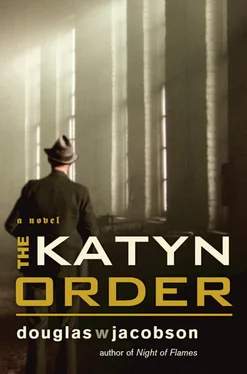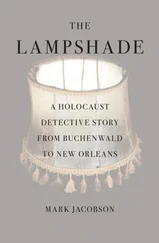He paused at one of the bookshelves and scanned the titles. They were mostly German, but included a smattering of English and French, even some Polish. He noticed an entire shelf of German legal volumes: maritime law, taxes, labor law. He skimmed through the volume on labor law, shaking his head at the sections dealing with fair pay and penalties for discrimination. He shoved it back on the shelf, guessing it was written before the Nazis took over, and headed for the kitchen.
Adam stepped through the swinging door, just as the gray-haired man in the tweed coat dragged a crate filled with vegetables and fresh bread through the kitchen. He stopped abruptly and straightened up, to stand stiffly, staring at Adam. “Guten Morgen,” Adam said.
The man nodded. “Guten Morgen.” He appeared to be in his sixties, thin and tired-looking. The tweed coat was well-worn but clean. The man fidgeted, his eyes darting around as though he were trying to decide what to say next. Before he could respond, a woman stepped into the kitchen from the same back door.
She bowed her head to Adam and said in fractured English, “Good morning. I Frau Hetzler. This is husband.” She wore a crisp white apron over a flower print dress, her gray hair knotted in a tight bun. She shot a sharp glance at her husband, who bent down and dragged the crate into a large pantry. Then she bowed again and stepped through a second set of swinging doors, beckoning Adam to follow.
They entered a room Adam had not seen the night before. It was apparently a breakfast room with floor-to ceiling leaded glass windows, half of them boarded up, overlooking the terrace. A massive oak table dominated the center. On a sideboard stood a coffee urn, cups and saucers; a cream and sugar service; and a platter of dark bread and cheese. Frau Hetzler served coffee, then gestured toward the cream and sugar, and the platter of bread and cheese.
Still having trouble adjusting to this sudden abundance of food, Adam settled for coffee, holding the cup under his nose for a moment, savoring the sweet aroma. He was stirring in the cream when a man’s voice from behind said, “The coffee is real and so is the cream.”
Adam turned and saw Colonel Meinerz standing in the doorway. Frau Hetzler had disappeared. “Good morning,” Adam said, and took a sip of the first real coffee he’d had in years. “How is it possible?”
Meinerz stepped over to the sideboard and poured a cup for himself. “The owner had a pile of ten-kilo sacks of coffee beans squirreled away in the cellar along with a dozen blocks of cheese, some bags of sugar and a case of French cognac. As for the cream, the Hetzler’s keep a cow locked in a garage in back of the house.”
“The Hetzler’s are the caretakers?”
Meinerz nodded as he carved a slice of cheese. “Yes. We’re all amazed the cow is still here.”
“That’s because Ivan cares more about drinking than eating,” said a new voice from the doorway. A stocky crew-cut American officer entered the room and stepped up to Adam. “Major Mark Thompson.”
Adam shook the officer’s hand and introduced himself.
“According to Herr Hetzler,” Thompson said with a laugh, “there was a lot more than one case of cognac in that cellar before the Russians got here. They probably got so plastered they couldn’t even see the cow, let alone try to shoot it.”
“Mark was the first one here,” Meinerz said, “so he got all the inside dope from Herr Hetzler.”
Thompson had poured himself a cup of coffee and was stirring in a third spoonful of sugar. “Yeah, it was just the old man and me for the first two days. Frau Hetzler was so terrified of being raped by the Russians that she locked herself in the garage.”
Frau Hetzler returned with boiled eggs and sausages, then backed out of the room again as Colonel Meinerz pulled out a chair. “Well, gentlemen, shall we have breakfast?”
When they were seated, Thompson immediately began to spread strawberry jam on a slice of bread. “So, you’re the chap representing the Polish Government?” he said to Adam. “And you’re American?”
“An American with special ties to Poland,” Adam replied.
“You’ve spent time in Poland, then?”
“I was born there.”
Meinerz cut in. “I’ll explain it all later.” Then he turned to Adam. “I’m not sure I mentioned it last night, but we’re the only ones staying here at the moment. Since we don’t have clearance from the Russians to visit Sachsenhausen yet, the rest of the team has gone down to Dachau. At least that’s in the American sector, and we don’t need their fuckin’ permission. Mark will be joining them later today. You’ll go with me to visit the Russians here in Berlin and see what we can get done.”
It was mid-afternoon before Colonel Meinerz was able to set up a meeting. The same young corporal arrived with the Jeep, and Adam and Meinerz climbed in the back.
“No ‘escort’?” Adam asked.
“The boundaries of our access zone change almost daily,” Meinerz said. “As of 0100 this morning the entire suburb of Schoenberg is part of the American sector. But you can bet your ass they’ll be waiting for us at the Kommandatura.”
“The Kommandatura?”
“The Allied Control Council, where the occupying powers are supposed to work out the administration of the country.”
The Kommandatura was housed in a former Supreme Court building in Schoenberg, a four-story, fortress-like structure with marble stairways arching up from either side, leading to stout, three-meter-high, oaken doors. As Meinerz predicted, a Russian Army truck was waiting for them in front of the building. This time, however, the scruffy Red Army soldiers in the back had been replaced by snappily uniformed NKVD riflemen.
“Looks like we’ve moved up in the world,” Adam said. “Who are we going to see?”
“A Red Army general by the name of Kovalenko.”
Adam inhaled sharply then coughed, trying to hide his surprise.
Meinerz glanced at him. “Something wrong?”
“It’s nothing,” Adam said. “Just some of this damn dust in my throat.”
There was a suspicious look in Meinerz’s eyes, and Adam turned away, thinking about Kovalenko, wondering if the general would remember him. Most likely he would, but all Kovalenko would have known on that night eight months ago was that Adam was an American diplomat, an obscure envoy sent by the Polish Government-in-Exile. It was the same story now. There was no connection to the AK, no connection to “Wolf.”
The driver retraced the same route back to the Landwehrkanal, then crossed the foul-smelling waterway on one of the only intact bridges and headed toward what was left of the Berlin city center.
Adam found some vengeful comfort in the destruction on the other side of the canal. Detouring around craters and mountains of rubble, they followed the Russian truck through a maze of barely passable streets lined with demolished buildings and eventually entered a vast open area of fetid swamps on either side of a pockmarked road. The remains of armored vehicles lay mired in muck, scattered among thousands of charred tree stumps. It took Adam several minutes, mentally recalling maps of Berlin, to figure out where they were. He nudged Meinerz’s shoulder. “The Tiergarten?” he asked, remembering pictures he had seen of Berlin’s magnificent central park.
“What’s left of it,” Meinerz said. Then he pointed to a shadowy silhouette off in the distance. They turned right and followed an intersecting road through the murky swamp, drawing closer to the silhouette, now recognizable through the haze as the shattered remains of a colossal building with four towers and a domed top. “The Reichstag,” Meinerz explained. “The SS Nordland Battalion was holed up there in the final days of the assault. The Russians circled it with heavy artillery and spent a whole day shelling it before the battalion surrendered. It’s a wonder there’s as much of it left as there is.”
Читать дальше












